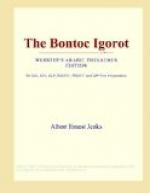On the 13th of April, 1903, the wife of A-li-koy’, of Samoki, gave birth to twin babies. Contrary to the advice and solicitations of the old men and the universal custom of the people, A-li-koy’ saved both children, because, as he pointed out, an Ilokano of Bontoc had twin children, now 7 years old, and they are all right. Thus the breaking down of this peculiar form of infanticide may have begun.
Abortion
Both married and unmarried women practice abortion when for any reason the prospective child is not desired. It is usual, however, for the mother of a pregnant girl to object to her aborting, saying that soon she would become “po’-ta” — the common mate of several men, rather than the faithful wife of one.
Abortion is accomplished without the use of drugs and is successful only during the first eight or ten weeks of pregnancy. The abdomen is bathed for several days in hot water, and the body is pressed and stroked downward with the hands. The foetus is buried by the woman. Only the woman herself or her mother or other near female friend is present at the abortion, though no effort is made at secrecy and its practice is no disgrace.
Child
Care of child in parents’ dwelling
All male babes are called “kil-lang’” and all girl babes “gna-an’.” All live practically the same life day after day. Their sole nourishment is their mother’s milk, varied now and then by that of some other woman, if the mother is obliged to leave the babe for a half day or so. When the babe’s first teeth appear it has a slight change of diet; its attendant now and then feeds it cooked rice, thoroughly masticated and mixed with saliva. This food is passed to the child’s mouth directly from that of the attendant by contact of lips — quite as the domestic canary feeds its young. The babes are always unclothed, and for several months are washed daily in cold water, usually both morning and night. It is a common sight at the river to see the mother, who has come down with her babe on her back for an olla of water, bathe the babe, who never seems at all frightened in the process, but to enjoy it — this, too, at times when the water would seem to be uncomfortably cold. One often sees the father or grandmother washing the older babes at the river.
But in spite of these baths the Igorot babe, at least after it has reached the age of six or eight months, when seen in the pueblo is almost without exception very dirty; a child of a year or a year and a half is usually repulsively so. Its head has received no attention since birth, and is scaly and dirty if not actually full of sores. Its baths are now relatively infrequent, and its need of them as it plays on the dirt floor of the dwelling or pabafunan even more urgent than when it spent most of its time in the carrying blanket.




